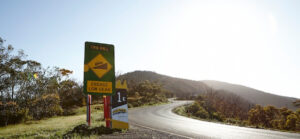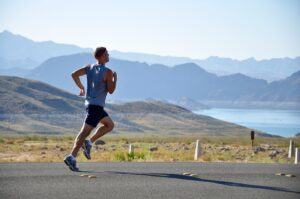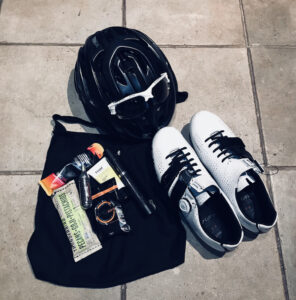

Last weekend there were 2 major endurance events that friends and team mates competed in: the Tour of Bright (ToB) and Ironman Busselton. I am always impressed when I read the race reports that they write in the days following the event. I’ve competed in the Tour of Bright a number of times, so I know the challenges of getting there, performing the way you’d like to and managing what happens when things don’t go the way you’d planned.
What impacts our performance?
For each of these events there are a number of factors that contribute to your performance. These factors are common to all endurance events, whether it is a competition or participation event:
- the terrain the event utilises and the distances – are there hills or mountains? is it flat or rolling? how long is the event or each stage?
- the weather conditions – is it hot, dry, raining, windy, or cold?
- the competition – who has actually entered the race? and who will you be racing?
- your preparation and training – have you trained over that distance and terrain?
- the way you manage your energy intake and expenditure and also your recovery
- your headspace – how are you thinking in the lead-up to, immediately prior to and during a race and if it’s a stage race how are you thinking between stages?
Managing the uncontrollable…

Some of these factors are outside your control. We often can’t choose the terrain the event covers. We can’t alter the weather. We have no control over who else chooses to enter an event. But we CAN shift the way we think about these factors… this is within our control.
We can choose to train over the actual course or over similar terrain to learn how we can adapt our running or cycling (or other sport) to suit the terrain. We can review the weather forecast and prepare appropriate clothing and hydration. Although it sometimes pays to have alternatives; for example the weather can be unpredictable in Alpine areas. I remember one ToB when the final stage was unexpectedly shortened due to wind and freezing weather at the top of Mt Hotham. Those who had packed warm clothing coped with the descent after the stage much more comfortably. We can choose to focus on how tough the competition might be, or we can choose to focus on our own performance.If we focus on others we might forget what we need to do during a race.
Controllable factors
Training and preparation
We have the ability to choose how we train and prepare for an event. If you want to do a 10km  run it might be wise to know that it is possible for you to actually run that distance comfortably. If you haven’t covered this distance before, you might build up the distance of your training runs over the weeks or months prior to the event. If you have covered this distance before, you might train the increase your pace, or speed, in the lead up to the event. This training is generally guided by the goals you’ve set for the event. Sometimes it can be helpful to have a coach to assist you to set these goals and design a training program with your goals in mind.
run it might be wise to know that it is possible for you to actually run that distance comfortably. If you haven’t covered this distance before, you might build up the distance of your training runs over the weeks or months prior to the event. If you have covered this distance before, you might train the increase your pace, or speed, in the lead up to the event. This training is generally guided by the goals you’ve set for the event. Sometimes it can be helpful to have a coach to assist you to set these goals and design a training program with your goals in mind.
Energy or food…
You have the ability to manage how you eat before, during and after an event. Eating during anendurance event is an important component of performance management. Knowing how much to eat before an event and how long before an event starts is individual and can often be worked out through training and maybe with assistance from a coach, dietician or nutritionist.
If you forget to eat during an endurance event you could hunger flat… this is an unpleasant experience. We struggle to keep going because our body is running low on the energy it needs to keep performing. It’s like a car running out of fuel… even though a car is likely to just stop and we can keep going but our pace drops significantly when there is so little fuel for our body to burn.
Knowing how to replenish our energy stores after en event or between stages is also individual.But you do need to replenish the energy expended during an event. This is also something we can learn through experience, research or with the assistance or a coach, dietician or nutritionist.
Your headspace or mindset
How you think can have a significant impact on how you perform. I’ve written about this previously and you can find that article here. The article is about Mindset; it is Part 3 of a series titled The Psychology of Bike Racing. My audience for that article was cyclists so it is biased towards cycling events versus running or triathlons. Please do have a look at it and if you would like me to generalise the ideas so you can apply them to other sports please send me a email or you can message me through Facebook.
This time I’m going briefly outline how the way we think can impact our experiences during events. I read my friends race reports and read the captions they added to their photos on social media. Some of them performed the way they wanted to. They achieved the results they were chasing and their comments reflected this:
- “Massive goal reached today.”
- “What a way to round off the year!”
- “… stoked to take home 3rd in the TT…”
And others had a tougher weekend:
- “When things aren’t going your way, you can at least hand out high fives and make someone’s day… reset and onto the next one.”
- “Racing bikes is brutal for your headspace.”
- “It was a weekend of much grimacing, of testing my mental strength, and pushing myself to places my legs and mind didn’t want to go.”
- “I smiled, I grimaced, I breathed so deeply I felt Hotham air in my cells.”
- “But I’m here, and I’m riding, and that’s ok too.”
- “And life can indeed be hard… I am deeply grateful…” (the full quote was beautiful)
The above quotes have not been attributed to maintain the anonymity of the competitors and for the most part they are only a portion of the comment. They were mostly written after the events were completed and all illustrate where our mindset might be at the end of target event when things might not go as planned.
During an event…
I’m going to provide 2 contrasting illustrations of how our mindset can have a significant influence during an event. They are both from different editions of the Tour of Bright, but the same course.
- Stage 1 The Gaps Loop – The ToB used to be a 2 day 3 stage tour and the Gaps Loop was the first stage on Saturday morning with the time trial as second stage on Saturday afternoon. It made for quite a different race. I had had a good preparation for the event and was feeling good. The bunch got to the first climb and halfway up I could still see the leaders… I was wrapt because I am not a climber. It’s a long time ago, but I can imagine my thoughts were a little like this: “awesome… I can still see them… I’ll catch them on the descent… then I’ll sit in the bunch… this is so good… I’m so happy I’m still in the hunt for the second sprint… I can get there… yes, I’m at the top… oh my legs hurt… and my lungs… now for the descent… this is so much fun…” This stream of thoughts contributed

Photo by Sydney Rae, source Unsplash to such a good mood that it was relatively easy, despite the effort required, to keep pushing up the climb and then along the rolling Kiewa Valley Highway. I was able to reach my goal of taking maximum points on the second sprint. This meant that my mindset going into the final climb was focussed on putting in a solid effort to the top.
- Stage 2 The Gaps Loop – A number of years later, the ToB was now a 3 day tour with the time trial moved to the first stage. I thought I had had a good preparation and was feeling good. But I wasn’t able to place in the first sprint, then I started struggling on the early part of the first climb. I continued struggling all the way up

Photo by James Pond, source Unsplash that climb. My thoughts on this occasion were very different and likely to sound a little like this: “This is so hard… I can’t breathe… this hurts so much… maybe I can get on her wheel… no I can’t… I’m so bad… This is the worst experience… I can’t do this… I’m hopeless… Maybe I can catch them on the descent… no… no way… I’m not catching them, no matter how fast I bomb this descent… I don’t want to start tomorrow… (and when it started raining on the final climb) I’m definitely not starting tomorrow… this is miserable… I’m going so slow… This is the worst…” I did almost pull out, but my coach at the time suggested that if I didn’t start Stage 3 it would be forever unfinished. I did finish, but the next day was just as tough and painful and my thoughts continued along the same unhelpful line and my experience was completely miserable. I felt crushed.
In each of these examples it’s easy to see how my mindset was either helpful or unhelpful for my performance. You can imagine that now I might suggest that what we need to do in this sort of situation is to shift and change our mindset. This is a lot easier said than done. I started the final stage and finished it because I didn’t want the Tour to be left unfinished, but there were many other things I could have done to work on shifting my mindset from the moment I finished Stage 2.
I know that I could have altered my goals a little more, I could have worked on shifting my unhelpful thoughts to more helpful ones or created responses that might have diffused to more common unhelpful thoughts. Sometimes reframing our thoughts can be helpful. It might have been more helpful to respond to some of these thoughts with “so what?” or maybe “and?”. If I had reset my goals from just finishing to “I’m going to ride within myself, I’m going to let the sprinters go and not chase them or try to compete, I’m going to do my best to enjoy the climb, I’m still riding, I’m going to learn what I can from this experience, I’m going to get wet and cold but I’ll stay warm, I shift my focus to my breath or counting down the kms, or the view, or the sounds instead of the struggle to keep riding.”
Read more…
As noted before I have written about Mindset in racing in the past. Please do click here to have a look at how you can adjust your mindset for competition or completing a participation event.
If you would like to learn more and would like to have a chat with me about how I might be able to assist you to shift your mindset, please contact me or you can go to the Enhance Life Psychology Facebook page and contact me via messenger.
Also if you think this post might be helpful for someone you know… please share it with them.
